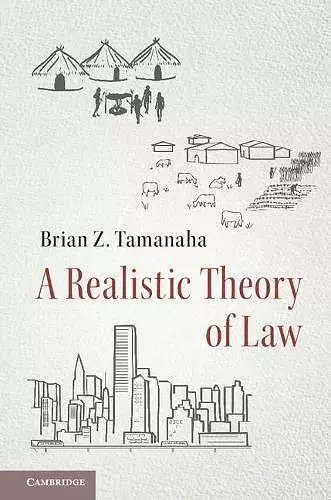A Realistic Theory of Law
Format:Paperback
Publisher:Cambridge University Press
Published:26th May '17
Currently unavailable, and unfortunately no date known when it will be back
This paperback is available in another edition too:
- Hardback£105.00(9781107188426)

The book re-orients jurisprudence and develops an empirically informed theory of law that applies throughout history and across different societies.
This book is for legal theorists and social scientists interested in a theory of law as a social institution that changes in form and function over time and place, in connection with social, cultural, economic, political, ecological, and technological factors. The realistic theory presents a holistic vision of law within society.This book articulates an empirically grounded theory of law applicable throughout history and across different societies. Unlike natural law theory or analytical jurisprudence, which are narrow, abstract, ahistorical, and detached from society, Tamanaha's theory presents a holistic vision of law within society, evolving in connection with social, cultural, economic, political, ecological, and technological factors. He revives a largely forgotten theoretical perspective on law that runs from Montesquieu through the legal realists to the present. This book explains why the classic question 'what is law?' has never been resolved, and casts doubt on theorists' claims about necessary and universal truths about law. This book develops a theory of law as a social institution with varying forms and functions, tracing law from hunter-gatherer societies to the modern state and beyond. Tamanaha's theory accounts for social influences on law, legal influences on society, law and domination, multifunctional governmental uses of law, legal pluralism, international law, and other legal aspects largely overlooked in jurisprudence.
'This book displays Tamanaha's strengths: it is thoughtful, grounded on broad scholarship, written clearly, argued well, and offers a fair portrayal of contrary views. … This is a very good and very important work. It is learned, clear, and provocative - in the best sense of that word.' Brian H. Bix, Frederick W. Thomas Professor of Law and Philosophy, University of Minnesota
'Tamanaha has written a book which will revive socio-legal theory and, in particular, will re-introduce historical jurisprudence as a key dimension for any social theory of law. This is a timely and important book, and promises to make a contribution to legal theory equal to if not more important than Tamanaha's earlier landmark books. Tamanaha works out a systematic account of the way in which concepts and notions of law transform from one historical era to another, at both local, state, and international levels, thereby showing detached, ahistorical theories to be misguided. The book will be of interest not only to socio-legal theorists and students, but to legal philosophers as well, as Tamanaha sets many of his key arguments against much mainstream analytical legal theory (e.g. the work of H. L. A. Hart, Joseph Raz, and John Finnis).' Michael Giudice, York University, Canada
'This book presents a masterly overview of a complex tradition. Tamanaha combines a bold historical overview with acute analysis to make a compelling case that social legal theory and empirical studies are an essential part of understanding law.' William Twining, University College London
'This book develops a holistic theory of law as a social institution with varying forms and functions, tracing law from hunter-gatherer societies to the modern state and beyond.' Howard S. Erlanger, Law & Social Inquiry
ISBN: 9781316638514
Dimensions: 227mm x 152mm x 12mm
Weight: 320g
208 pages